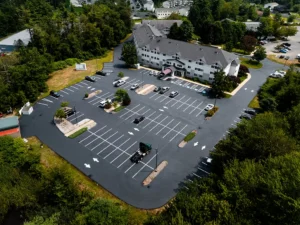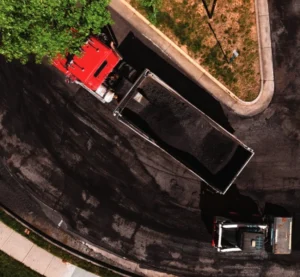A gleaming, pristine, and flawless pavement adds to the appearance of your home or property, and the satisfaction you get from this makes you want to keep the pavement that way forever. Unfortunately, asphalt can deteriorate fast despite being durable and the material of choice for paving projects. Asphalt pavement can dry out, fade, crack and crumble quickly, so routine maintenance is recommended to maintain the aesthetic appeal and extend the pavement’s lifespan.
One way to keep your pavement in good condition is the seal coating. But with the availability of alternative asphalt maintenance solutions, how do you know if seal coating is right for you? In this article, we’ll cover the pros and cons of seal coating to help you make that decision.
What is Asphalt Seal Coating?
Seal Coating, or pavement sealing, involves the application of a protective coating on asphalt surfaces to provide a layer of protection against water, UV rays, oils, chemicals, and other elements. The protective coating fills any cracks and crevices, preventing elements from getting into the gaps and causing more damage. Therefore, seal coating aims to reduce weather damage, prevent oxidation, and create a slip-resistant asphalt surface, which helps maintain the condition of the pavement.
Pros of Asphalt Seal Coating
- Restore the deep, black, fresh appearance: over time, the pavement fades, greys out, and becomes dingy due to exposure to water, sun, oils, and other elements. Seal coating can help restore the deep, rich, glossy black color, improving your property’s curb appeal.
- Extend the lifespan of the pavement: since seal coating serves as a protective barrier against UV rays, oils, water, and other toxic substances, your pavement is guaranteed to last longer.
- Prevents pavement from becoming brittle: the binder used in the original asphalt makes it more flexible and pliable. However, elements can cause it to stain and dry out over time. When this happens, the pavement that was once flexible becomes brittle and prone to cracking under pressure. Sealcoating prevents damage and keeps the binder flexible and pliable.
- Cost-effective: seal coating costs way less than repairing the surface or having to lay fresh asphalt.
Cons of Asphalt Seal Coating
- The pavement must be in good condition: while seal coating might offer a protective layer and restore the driveway’s aesthetic appeal, it won’t repair cracked or crumbled pavement.
- Should be applied repeatedly: seal coating helps extend the life of a pavement, but the sealant itself may only last up to two years before you’ll need to replace it.
- Demands specific weather conditions: seal coating during winter is a bad idea since cold weathers affect the sealant’s performance. The weather must be right for the seal coating to serve its purpose.
- Doesn’t prevent all kinds of damage: even though seal coating lessens the risk of asphalt becoming brittle, the surface is still susceptible to heavy loads.
- Cannot work on fresh asphalt: if you’ve recently applied new asphalt pavement, you’ll need to wait until it has completely cured before seal coating.
Bottom Line
The appropriateness of seal coating depends on a number of factors, ranging from the condition of the asphalt pavement, prevailing conditions, and budgetary needs to your goals. Deciding whether or when to go for seal coating is essential to realize its full potential. However, this may not be an easy decision for you, which is why Pro-Pave Inc. is here to help.
At Pro-Pave Inc., we are a professional asphalt paving and repairs company with several decades of offering quality services at affordable rates. We go the extra mile to make sure we deliver beyond your expectation. Need help with seal coating? Contact us today for a quote.



